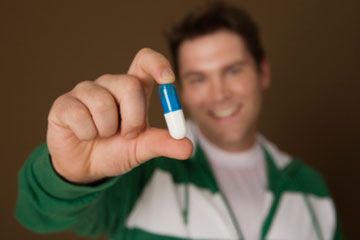Body odor can be unavoidable at times -- especially after a day at the gym or at an important job interview. But defeating a case of body odor may be as simple as understanding its origins. In contrast with eccrine sweat glands found across the vast majority of skin, apocrine sweat glands in the armpit, groin and scalp produce a different type of "fatty" sweat [source: Mayo Clinic Staff]. On the surface of the skin, this type of sweat makes a perfect meal for microorganisms such as bacteria, which break it down and produce an odorous byproduct.
With this is mind, there are many ways to limit body odor: Bathing more often, using products such as deodorants and antiperspirants, washing clothes frequently, reducing stress and sometimes altering your diet can help. People who don't sweat enough or sweat too much during everyday activities should discuss the issue with a doctor [source: MedlinePlus]. In cases of excessive sweating, a person may receive a prescription-strength antiperspirant with aluminum chloride. If taking this approach, use these antiperspirants as directed by your doctor.
Advertisement
But what about certain vitamins and supplements? Does folic acid help with body odor?
Folic acid, a water-soluble B vitamin that plays a role in maintaining healthy cells, can be taken as an oral supplement. The natural form of the vitamin -- folate -- is found in foods including some fruits and vegetables, animal livers, dried yeast and certain beans, to list a few [source: National Institutes of Health]. Breads and cereals can be fortified with folic acid, too.
A doctor may prescribe folic acid for many different reasons -- the most common being folate deficiency [source: National Institutes of Health]. Despite folate's importance to both sexes, pregnant women take folic acid supplements to reduce birth defects in fetuses. All people, however, should consult a doctor when taking folic acid since it can cause health problems if taken incorrectly.
Choline -- a nutrient usually metabolized with folate -- causes body odor in people who can't break down a specific compound in choline-rich foods [sources: Genetics Home Reference, Howe et al.]. Whether folate plays a role in causing or helping this type of body odor is unclear -- and there's not much evidence to prove that folic acid can banish undesirable body aromas at this time.
Since a change in diet can do the trick in eliminating body odor for some people, it may be tempting to credit the new foods. One study even found that people who ate meat produced worse body odor than people who did not [source: Havlicek]. Garlic and onions are known to cause more pungent body odor as well. Limiting foods that trigger body odor may be the real cause of fixing the problem -- not adding new foods that may be rich in folate.
Ultimately, if the tried-and-true techniques of getting rid of body odor don't help, you should visit your doctor to discuss other options.
Advertisement



